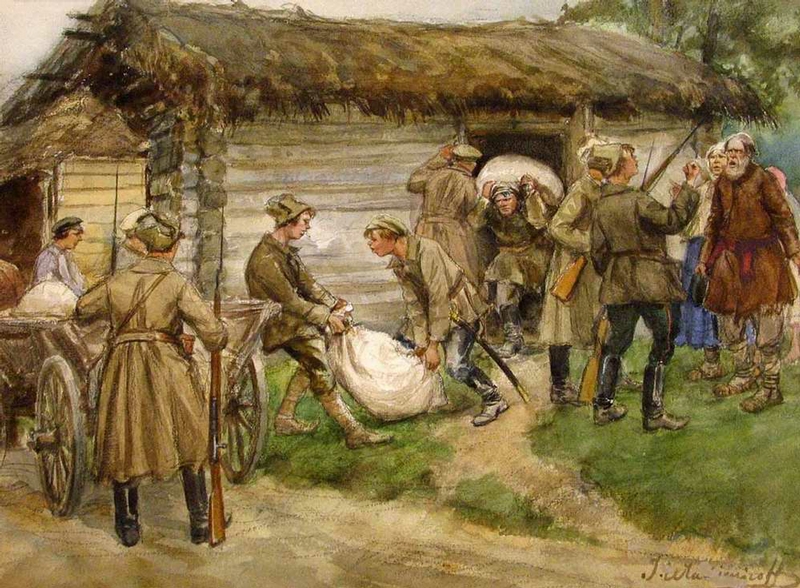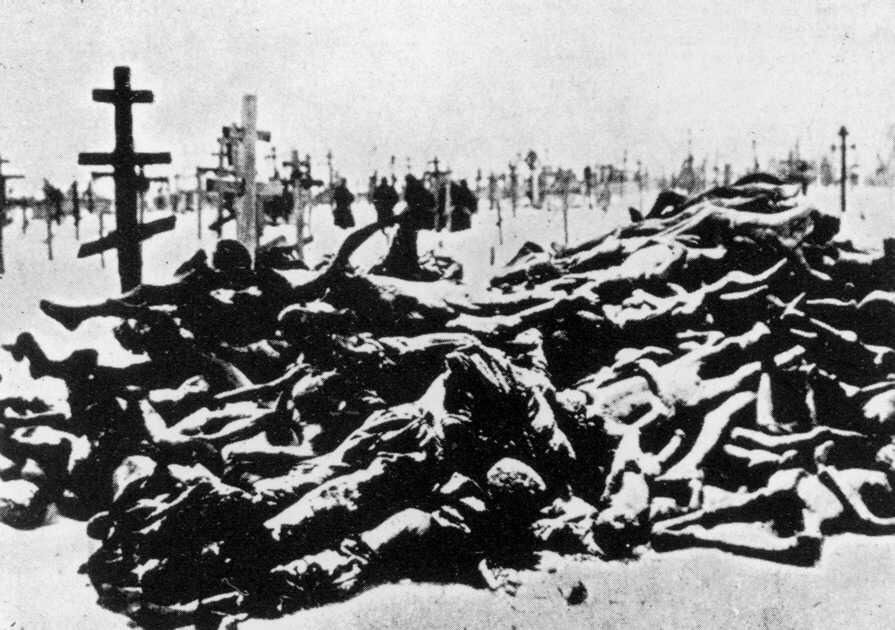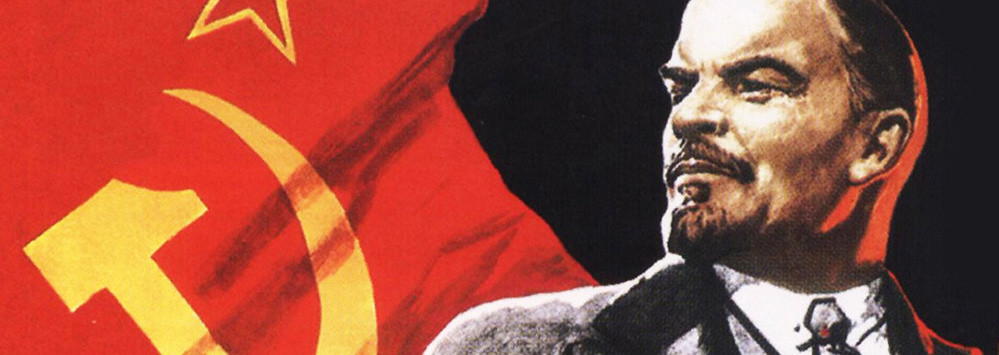The evil motive of communist rejection to charity towards the needy: the case of Lenin
Despite having left a trail of poverty, oppression and death in various countries, there are still people who think that communism is an ideology with a good intention: to help the poorest.
Lenin: a privileged born in a wealthy family
If there are still people who have such a benevolent idea of communism, it is because they do not know the way of thinking of their most famous figures or, what is worse, because they share their opinions. I want to address here a very little-known facet of the first Communist dictator: Vladimir Ilyich Ulyanov, better known as Lenin. The communist leader was born into a wealthy family in Simbirsk (Russia), a city on the banks of the Volga River, in 1870. In fact, thanks to the well-off position of his family, Lenin had the opportunity - like his older brother- of pursuing university studies of Law, something unattainable for the vast majority of the Russian population at that time. It was in his university days when he came into contact with the ideas of Karl Marx and began his Marxist militancy. He obtained his university degree in 1892, coinciding with a great famine that began precisely in the Volga Valley.

The unsupportive attitude of the young Lenin before the famine of 1891
That famine, which left hundreds of thousands dead, triggered a movement of national and international solidarity. A large part of Russian society started a great mobilization to help the needy. One of the most famous Russians involved in that aid campaign was the novelist Leo Tolstoy. The United States also chartered several ships that brought food and grain to Russia, after raising numerous funds through donations made by US citizens. At that time Lenin practiced as a lawyer in the city of Samara, on the banks of Volga, one of the places most affected by the famine. His family had an estate in Alakáievka, near the city. Unlike his compatriots and the people of other countries who sent aid to Russia, the attitude of the young and well-to-do Lenin was openly unsupportive: "He was the only representative of the local intelligentsia who not only did not participate in social assistance to the hungry , but pronounced itself categorically against it", according to Stéphane Courtois, Nicolas Werth, Jean-Louis Panné, Andrzej Paczkowski, Karel Bartosek and Jean-Louis Margolin in The Black Book of Communism (1997).

Lenin thought that "hunger had many positive consequences"
What was the reason for the unselfish attitude of young Lenin? The answer was offered by Alexey Alexandrovich Beryakov (1869-1927) in his memoir Юность вождя: воспоминания современника (The Leader's Youth: Contemporary Memories), published in Moscow many years after his death, in 1960. Belyakov came from a family peasant. He began his Marxist militancy in the 1880s and met Lenin in the Marxist circle of Samara during the years of famine and ended up being friends. The reason that Belyakov's memoirs remained censored for so many years in the USSR was that he spoke of Lenin as a friend of worldly customs. For example, he commented that they liked to spend time in the Zhiguli brewery (perhaps the Soviet authorities did not see with good eyes that the idealized Lenin was associated with such bourgeois customs). Belyakov recognized worse things, such as this comment on pages 80-82 of the book on the attitude of Lenin before the famine:
"Vladimir Ilyich Ulyanov had the courage to declare openly that hunger had many positive consequences, namely the appearance of an industrial proletariat, that undertaker of the bourgeois order. (...) By destroying the backward peasant economy, hunger, he explained, objectively brings us closer to our final goal, socialism, a stage immediately following capitalism. Hunger destroys not only faith in the Tsar, but also in God."
The famine caused by the Bolsheviks in 1921-1922
Remember that those words were not written by a detractor of Lenin or an enemy of Marxism: that was written by a friend and co-religionist of Lenin. Many people may think that Lenin was then young and immature, and that over the years his vision of society changed. Rather, it was the opposite. After refusing to help the hungry for political reasons, Lenin's dictatorship sparked a severe famine in 1921 and 1922. This famine was triggered, in large part, by the massive requisitions of grain ordered by the Bolsheviks, a policy known as Prodrazvyorstka, which was copied and enlarged by the communists of the so-called Razvyorstka, the requisitioning of Czarist grain in the First World War. The requisitioned grain was often used for export, in order to obtain income for the State, a vileness that was repeated during the Stalin dictatorship, provoking the most known Ukrainian genocide.

That Russian famine of 1921 and 1922 gave rise, as in the Tsarist era, to a movement of solidarity among the Russians. But if in 1891 that movement had had the support of the Tsar and the Orthodox Church, this time the dictatorship of Lenin was hostile to it. The movement was headed by a committee whose prominent figure was the economist Yekaterina Kuskova, a person critical of the Bolsheviks. Initially Lenin refused to receive the committee, despising his "sentimentality", but finally received one of its members in July 1921, after which the communist dictator issued an order: "Prevent rigorously that Kuskova can bother." Lenin ordered, likewise, accept "a wagon or two" and "nothing else".
Lenin ordered to dissolve and defame the committee to help the hungry
The committee got outside help, including the Red Cross and the United States, and also from the Russian Orthodox Church, which was being subjected to harsh persecution by the communist dictatorship. However, on August 26, 1921, only a month after receiving it, Lenin dictated to Stalin and the members of the Politburo an order to dissolve the committee of aid to the hungry, which he called "Kukishi" (you can see the note in the Marxists Internet Archive), arrest one of its leaders and expel from Moscow the others, and launch a campaign of defamation against them. He entrusted it to the Cheka, the brutal Soviet political police, known for their savage methods of torture.
"Not later than tomorrow we shall publish five lines of a short dry "government communiqué": dissolved because of unwillingness to work. We shall issue an order to the newspapers: the same day, tomorrow, start ridiculing "Kukishi" in a hundred ways. These whiteguards and sons of the landed gentry wanted to take a trip abroad and refused to go and work in the localities. Kalinin has gone, but the Cadets find it "unbefitting". They should be ridiculed and harassed in every possible way at least once a week in the course of two months."

Lenin used the famine that he himself caused to accumulate all the power
Foreign aid continued to arrive from the Red Cross and the United States. If not for that, the situation would have had much worse effects. However, the State channeled the aid through a committee of Bolshevik officials, a slow and corrupt organism. The result: the famine affected some 27 million people and killed between 3 and 5 million. It was much worse than the Russian famine of 1891, but it also had a remarkable difference. And it is that the famine of 1921 was not accidental: it was done intentionally and for political purposes, as Lenin acknowledged in a letter addressed to the Politburo on March 19, 1922 that is kept in the bookshop of the US Congress:
"Now and only now, when people are being eaten in famine-stricken areas, and hundreds, if not thousands, of corpses lie on the roads, we can (and therefore must) pursue the removal of church property with the most frenzied and ruthless energy and not hesitate to put down the least opposition. (...) We must pursue the removal of church property by any means necessary in order to secure for ourselves a fund of several hundred million gold rubles (do not forget the immense wealth of some monasteries and lauras). (...) All considerations indicate that later on we will fail to do this, for no other time, besides that of desperate famine, will give us such a mood among the general mass of peasants that would ensure us the sympathy of this group, or, at least, would ensure us the neutralization of this group in the sense that victory in the struggle for the removal of church property unquestionably and completely will be on our side."
Thus, while the Orthodox Church pledged its resources to help the hungry, Lenin launched over it a wave of confiscations and propaganda, but also of arrests and murders: "The greater the number of representatives of the reactionary clergy and the reactionary bourgeoisie that we succeed in shooting on this occasion, the better" said the aforementioned order of Lenin. According to The Black Book of Communism (1997), the result was "the arrest of several thousand priests, monks and nuns. According to ecclesiastical sources, 2,691 priests, 1,962 monks and 3,447 nuns were murdered in 1922." The famine that the Communist dictatorship had provoked with its requisitions not only became a full-fledged genocide, but also served to concentrate enormous power in the hands of the communist elite and brutally suppress any attempt to reverse it. The result of that regime of terror was more than a million people killed for political reasons in six years, and between 3.9 million and 7.75 million dead by famines among Russians, Kazakhs and Tatars. Decades after those facts there are still communists trying to convince us that charity is bad and that it would be better to concentrate all the wealth - and with it all the power - into the hands of the State, that is, of the communists, so that they distribute it among the village. And the worst thing is that there are still naive people who believe it.
|
Don't miss the news and content that interest you. Receive the free daily newsletter in your email: Click here to subscribe |
- Most read
- The 'hole' without civil flights around Paris during the opening of the Olympic Games
- Spain vetoes the Russian frigate 'Shtandart', which intended to reach Vigo, in all its ports
- The interior of the Statue of Liberty torch and the sabotage that canceled its visits
- The ten oldest national flags in the world that are still in use today
- The BNG boasts of the support of a terrorist group and a dictatorship at a public event
- The Russian intelligence document that sparked a hoax about French troops
- A virtual tour of ancient Rome in full color, just as it was in its heyday

 ES
ES





Opina sobre esta entrada: